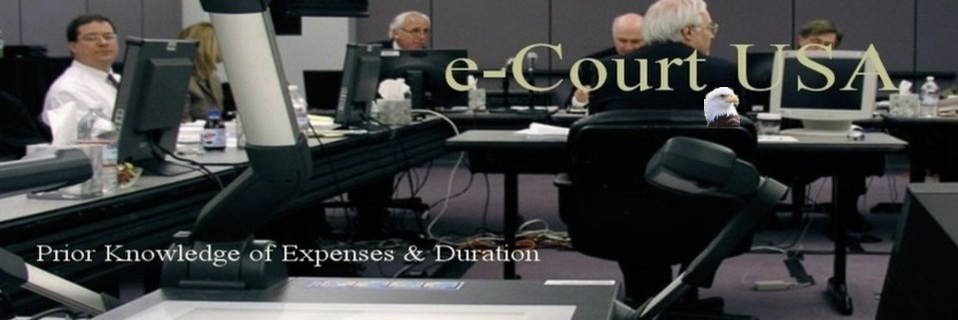Why your participation in e-Court is important?
Technology embraced and legal justice obtained with prior
knowledge of expense and duration

Private Individuals : Why participation in e-Court is important?

Online Dispute Resolution: Some Implications for the Emergence of Law in Cyberspace
Posted by Ethan Katsh

“What, then, is this law business about? It is about the
fact that our society is honeycombed with disputes.
Disputes actual and potential, disputes to be settled and
disputes to be prevented; both appealing to law, both
making up the business of law.This doing something
about disputes, this doing of it reasonably, is the
business of law.”
-Karl Llewellyn
Introdution
The tenth anniversary of Lex Electronica largely coincides with the tenth anniversary of two
other significant cyberlaw events. The first, the May, 1996 conference on online dispute
resolution sponsored by the National Center for Automated Information Research can be viewed
as the beginning of the online dispute resolution movement. This is a movement that has grown
from a single dispute handled by an entity called the Virtual Magistrate to several million
disputes handled by an Internet start-up SquareTrade. The second, also occurring in May, 1996,
was the publication in the Stanford Law Review of David Johnson’s and David Post’s seminal
article “Law and Borders – The Rise of Law in Cyberspace.”
The Johnson and Post article launched a rather heated and still ongoing debate. At the risk of
oversimplification, one side in this debate holds that authoritative rules for cyberspace can and
should come from territorial states.3 The other, articulated by Johnson and Post in their article,
argues that there are sufficient reasons for considering cyberspace to be a separate place which
can and should make its own rules. At a more basic level, the question being
asked is what
impact the new technologies are having on the authority and power of states to make and enforce
law. And at perhaps an even more basic level, the focus is on issues such as what law is and how
it emerges and evolves, issues that have a long history and, still, uncertain answers.
Given how many disputes are generated by online transactions, interactions and relationships, the
development of processes for using the Web for to respond to such problems is deserving of
significant attention in its own right. Yet, dispute resolution, an acknowledged core responsibility
of law, may, as will be explained below, acquire new responsibilities and characteristics as it
develops online. During the period when scholars have been debating whether states will cede
any of their sovereign authority to some kind of entity in cyberspace, states have, with relatively
little notice, been more than willing to allow dispute resolution processes to migrate to
cyberspace. This has occurred not only with no resistance but with some encouragement. It has
also been occurring with little understanding that processes that migrate to cyberspace often
change as they take advantage of capabilities for communicating and processing information that
are not available or employed offline. When this occurs, unintended consequences, for example
changes in how and where rules originate, may also occur.
Consider, for example, a practice that involves some regulation of the flow of information, such
as whether a process is public or private. In the offline world, such a decision is embedded in the
line separating litigation and what have come to be called “alternative dispute resolution
processes.” Litigation is a public process both in the sense that it is open to the public and
sponsored by a public authority. At the risk of some confusion, one could also say that it is public
(open) because it is public (sponsored by government). As processes of negotiation, mediation
and arbitration are employed online, and as the context in which these processes are employed
changes, the logic for guaranteeing confidentiality may be less compelling. Such a shift not only
affects the process for settling disputes but, if results are public and published, can lead to new
ways of standard setting. Were this to occur, it would have implications for the core question in
the Johnson and Post debate, namely how effective rules for cyberspace will emerge.
1. The Growth and Evolution of Online Dispute Resolution
While the Internet began in 1969, a need for ODR did not emerge until the early 1990s. For its
first two decades, the Internet was used by a limited number of people in a limited number of
ways. Those with Internet access were associated either with the military or with academic
institutions, and even in those environments, relatively few computers had Internet access. While
screens with images and email with advertisements are commonplace today, they were unknown
at that time. The World Wide Web was not invented until 1989 and, perhaps even more
significantly, the National Science Foundation banned commercial activity from the Internet until
1992.
In the early 1990s, groups used “listservs” to communicate, and this form of online discussion
soon generated “flaming” and violations of “netiquette,” personal attacks that violated generally
accepted norms for online discussions.5 Disputes also arose involving participants in role playing
games that allowed one to create an online identity and interact with others in a virtual “space.”6
Various online mechanisms were employed to deal with these conflicts, but there were no
organized dispute resolution institutions devoted specifically to ODR. Indeed, the acronym ODR
had not yet been invented.
The decision by the National Science Foundation in 1992 to lift its ban on Internet-based
commercial activity was highly controversial and enormously significant. After the ban’s
removal, disputes related to online commerce began to surface. In 1994, for example, the first
commercial spam occurred when two lawyers tried to recruit clients to participate in an
immigration scam.7 A few months later, the U.S. Federal Trade Commission filed its first case
alleging online fraud.8 The case involved an AmericaOnline subscriber who advertised the
following:
-
TOPICS:
- ABOUT e-COURT
- home
- preliminary information
- introduction ( About us )
- benefits
- scope of legal areas
- directorate
- supervisory board
- advisory council
- originating partners
- e-Court & ADRpartners
- articles of operation
- privacy
- legal information
- copyright
- in the news
- ( e-Court versus ADR )
- costs
- FREQUENTLY ASKED QUESTIONS
- *** introduction
- *** for bench lawyers
- *** for lawyers & arbitrators
- *** for notaries
- *** for insurance companies
- *** for companies
- *** FOR PRIVATE INDIVIDUALS
- *** for bailiffs
- *** security
- OFFLINE NETWORKING
Endorsements ( 1/2000 + ):
- Patricia M. Swerhone
Waters and Associates, Barristers & Solicitors, Toronto - Kenneth J. Byrne
Immigration and Real Estate Lawyer at Benson Buffett, Newfoundland And Labrador
Owner, Ackerman Law Office Professional Corporation, Toronto
- Steven Bellissimo
Partner Chappell Partners, Toronto - Glenroy Bastien
Partner Bastien Barrister & Solicitor, Toronto - Beth A. Sheppard
Shareholder/Director, Benson Buffett PLC Inc., Newfoundland And Labrador - Tony Lafazanis
Personal injury lawyer at Tony Lafazanis, Toronto, - Steve A.
Lawyer at Defend Your Points - Traffic Ticket Lawyers, Toronto - Tina Schultz
Owner ~ Broken Link Divorce Planning, Calgary - Joseph W.J. F.
General counsel at Law Office, New Brunswick, Canada - Abigail Wiley
TimberWest Forest Corp., Vancouver - Anna L.
University of Ottawa Law School - Anushika Anthony
Personal Injury Lawyers, Toronto - Sandra D.
Heenan Blaikie, Toronto - Young Lee
Lawyer, Barrister, Solicitor & Notary Public, Toronto - James A. Carr
Barrister and Solicitor at Carr Quinn King, Edmonton - Miller Thomson LLP
Gerald Chipeur, QC, Partner Calgary, Alberta - Adair
Morse LLP
John Adair, Toronto, Canada Area Law Practice - Bart
Law
Jaqueline Bart, Canadian Immigration Law - Clancy P.C. & Brion Raffoul
Paula Clancy, Managing Attorney at Clancy P.C.& Brion Raffoul, Ottawa Legal Services - ( Endorsements continued.....)















